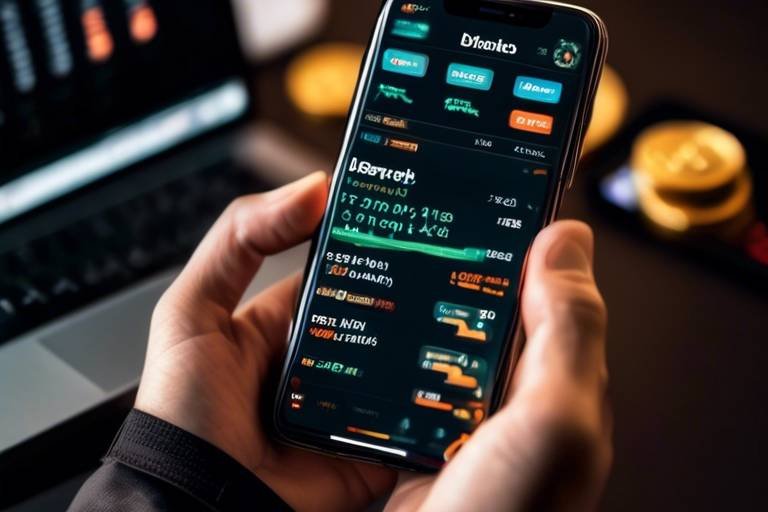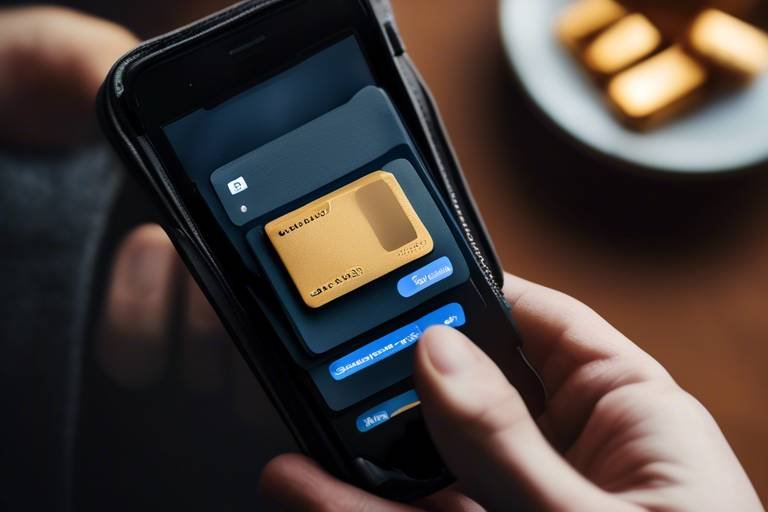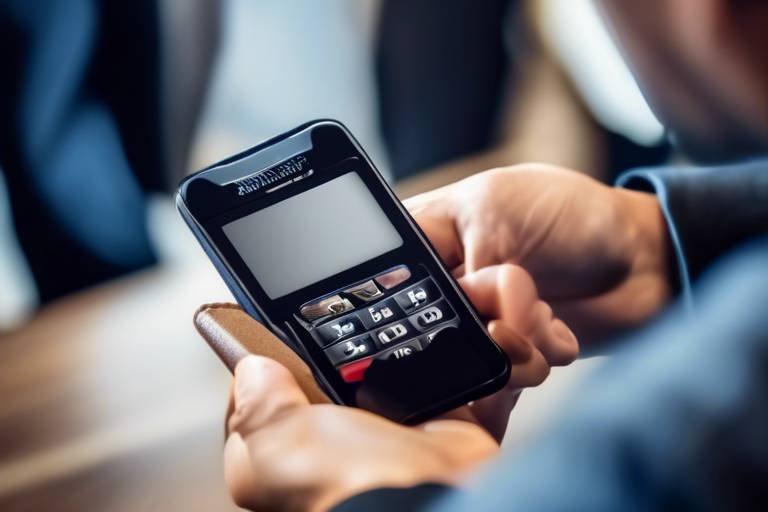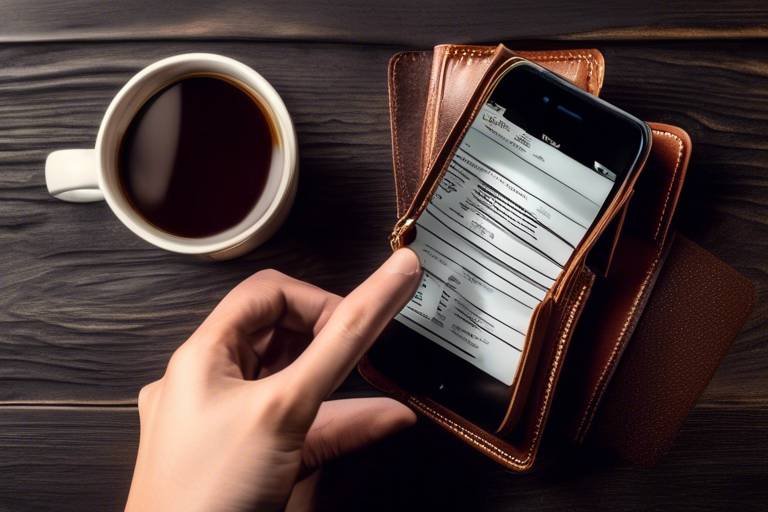How to Stay Ahead in the Crypto Market Using Wallets
In the fast-paced world of cryptocurrency, staying ahead of the curve can feel like trying to catch smoke with your bare hands. The market is constantly shifting, with new coins, trends, and technologies emerging almost daily. However, one of the most reliable ways to maintain a competitive edge is by effectively leveraging cryptocurrency wallets. These digital vaults are not just storage solutions; they are integral to your overall investment strategy. By understanding how to utilize wallets to their fullest potential, you can enhance your security, improve accessibility, and maximize your investment opportunities.
Imagine your cryptocurrency wallet as a high-tech safe where you can securely store your digital assets. Just like you wouldn’t leave your physical cash lying around, you shouldn’t leave your cryptocurrencies unprotected. Wallets come in various forms—some are like a bank vault, while others resemble a convenient purse that you can carry wherever you go. The key is to find the right balance between security and accessibility based on your investment goals. In this article, we will explore the different types of wallets available, their functionalities, and how they fit into the broader crypto ecosystem.
Understanding the nuances of cryptocurrency wallets can be your secret weapon in the crypto market. With the right wallet, you can not only safeguard your investments but also streamline your trading process. So, let’s dive deeper into the world of wallets and discover how they can help you stay ahead in this ever-evolving landscape.
Cryptocurrency wallets are essential tools for managing digital assets. They serve as the interface between you and the blockchain, allowing you to send, receive, and store cryptocurrencies. But what exactly are these wallets, and how do they work? At their core, wallets store your public and private keys, which are crucial for conducting transactions securely. Your public key is like your bank account number—it's safe to share with others when you want to receive funds. Your private key, on the other hand, is akin to your PIN code; it must be kept secret to protect your assets.
There are various types of wallets, each with its own unique features. Understanding these differences can help you choose the right wallet for your needs. Whether you're a casual investor or a seasoned trader, knowing how to navigate the wallet landscape is vital for success in the crypto market.
When it comes to cryptocurrency wallets, the options can be overwhelming. However, they can generally be categorized into three main types: hardware wallets, software wallets, and paper wallets. Each type has its pros and cons, and understanding these can help you make informed decisions about where to store your digital assets.
Hardware wallets are physical devices that securely store cryptocurrencies offline. Think of them as the Fort Knox of digital asset storage. They are designed to be immune to online threats, making them a favorite among serious investors who prioritize security above all else. With a hardware wallet, your private keys are stored on the device itself, away from the prying eyes of hackers.
One of the most significant advantages of hardware wallets is their enhanced security. Unlike software wallets, which are connected to the internet and therefore more vulnerable to attacks, hardware wallets keep your assets safe from online threats. Additionally, they often come with user-friendly interfaces, making them accessible even for those who are not tech-savvy. Here are some key benefits:
- Offline Storage: Keeps your assets away from potential online breaches.
- Secure Backup: Many hardware wallets allow you to create a recovery seed, ensuring you can recover your assets if the device is lost.
- Multi-Currency Support: Most hardware wallets support a wide range of cryptocurrencies, making them versatile for investors.
Several hardware wallets dominate the market, each offering unique features. Some of the most reputable options include:
- Ledger Nano S: Known for its robust security features and user-friendly design.
- Trezor Model T: Offers a touchscreen interface and supports a wide variety of cryptocurrencies.
- KeepKey: Combines security with a sleek design, making it a popular choice among users.
Software wallets, on the other hand, are applications that allow users to manage their cryptocurrencies conveniently. They come in various forms, including desktop applications, mobile apps, and web-based platforms. While they offer ease of use, they also come with potential vulnerabilities that investors should be aware of. For instance, if your device is compromised, so is your wallet.
Maintaining security is crucial in the crypto market. With the rise of cyber threats, ensuring that your wallet is secure should be a top priority. Here are some best practices to safeguard your wallets against theft, hacks, and other risks:
Implementing two-factor authentication (2FA) significantly enhances wallet security. This extra layer of protection requires you to provide two forms of identification before accessing your wallet. Setting up 2FA is straightforward and can be done through your wallet's settings. It’s a small step that can make a huge difference in protecting your digital assets.
Keeping your wallet software up to date is vital for security. Developers frequently release updates to patch vulnerabilities and improve functionality. By regularly updating your wallet, you can fend off potential threats and ensure that your assets remain safe.
Q: What is the safest type of cryptocurrency wallet?
A: Hardware wallets are generally considered the safest option as they store your private keys offline, making them less susceptible to hacks.
Q: Can I use multiple wallets?
A: Yes, many investors use a combination of wallets to diversify their security measures and manage different cryptocurrencies effectively.
Q: How do I recover my wallet if I lose my hardware device?
A: Most hardware wallets provide a recovery seed during the setup process. Keep this seed secure, as it can be used to restore your wallet on a new device.

Understanding Cryptocurrency Wallets
Cryptocurrency wallets are the backbone of managing digital assets in the ever-evolving world of cryptocurrencies. Think of them as your personal bank account, but instead of holding cash, they store your digital coins securely. Now, you might be wondering, what exactly is a cryptocurrency wallet? In simple terms, it's a software application or a physical device that allows you to send, receive, and store various cryptocurrencies. However, the magic lies in understanding the different types of wallets available and how they fit into the broader crypto ecosystem.
When you dive into the realm of cryptocurrency, you'll quickly realize that wallets come in various forms, each serving a unique purpose. They can be broadly categorized into two main types: hot wallets and cold wallets. Hot wallets are connected to the internet, making them convenient for daily transactions. On the other hand, cold wallets are offline storage solutions, providing a higher level of security for long-term holdings. Each type has its own set of functionalities and use cases, and understanding these can significantly enhance your crypto experience.
Let's break it down a bit more. Hot wallets, which include web wallets and mobile wallets, are user-friendly and allow for quick access to your funds. They are perfect for those who frequently trade or use their cryptocurrencies for purchases. However, because they are online, they are more susceptible to hacks and phishing attacks. In contrast, cold wallets, such as hardware wallets and paper wallets, offer robust security features. They are ideal for serious investors looking to store their assets away from the prying eyes of cybercriminals.
Here’s a quick comparison to give you a clearer picture:
| Type of Wallet | Connection | Security Level | Best For |
|---|---|---|---|
| Hot Wallets | Online | Low to Medium | Frequent transactions |
| Cold Wallets | Offline | High | Long-term storage |
Another critical aspect to consider is the importance of private keys. When you create a wallet, you're given a unique private key that acts like a password to your funds. Losing this key means losing access to your cryptocurrency, so it's vital to keep it secure. Some wallets even offer recovery phrases, which can help you restore access if you forget your private key. So, always treat your private keys like the crown jewels—they're that important!
In summary, understanding cryptocurrency wallets is crucial for anyone looking to navigate the crypto landscape effectively. Whether you prefer the convenience of hot wallets or the security of cold wallets, knowing the ins and outs of these tools will empower you to manage your digital assets confidently. As you venture further into the world of cryptocurrencies, remember that your wallet is more than just a storage solution; it's your gateway to the exciting and sometimes unpredictable world of crypto investments.

Types of Wallets: A Comprehensive Overview
When it comes to managing your cryptocurrency, understanding the different types of wallets is crucial. Each wallet type serves a unique purpose and offers various features that cater to different needs. Whether you're a seasoned investor or just starting your crypto journey, knowing which wallet suits you best can make all the difference. Let's dive into the three main types of cryptocurrency wallets: hardware wallets, software wallets, and paper wallets.
Hardware wallets are physical devices designed to securely store your cryptocurrencies offline. They are often seen as the gold standard for security, as they keep your private keys away from the internet, significantly reducing the risk of hacks and theft. Imagine them as your personal vault, where only you have the key. However, they can be a bit pricier than other options, which might deter some potential users. Still, for serious investors, the peace of mind they provide is often worth the investment.
On the other hand, we have software wallets, which are applications that you can install on your computer or smartphone. These wallets offer a balance between convenience and security. They allow for easy access to your funds, making transactions quick and efficient. However, since they are connected to the internet, they can be more vulnerable to cyber threats. Think of software wallets as your everyday wallet—easy to carry around but requiring some caution to avoid losing your cash. Within software wallets, there are two main types: desktop wallets and mobile wallets, each with its own set of features and security measures.
Lastly, we have paper wallets, which are essentially just physical pieces of paper with your private and public keys printed on them. They are a form of cold storage, meaning they are not connected to the internet, making them highly secure against online attacks. However, the risk lies in the physical aspect—if you lose the paper, you lose access to your funds. It's like having a treasure map; if you misplace it, the treasure is gone forever. Paper wallets can be a great option for long-term storage, but they require careful handling and secure storage.
To sum it up, each wallet type has its strengths and weaknesses, and the best choice depends on your personal needs and investment strategy. Here’s a quick overview:
| Wallet Type | Security Level | Convenience | Ideal For |
|---|---|---|---|
| Hardware Wallet | High | Medium | Serious Investors |
| Software Wallet | Medium | High | Active Traders |
| Paper Wallet | Very High | Low | Long-term Holders |
Understanding these wallet types will help you make informed decisions about how to store and manage your cryptocurrency assets effectively. As the crypto landscape continues to evolve, staying ahead of the curve means choosing the right tools for your investment strategy. So, which wallet will you choose to safeguard your digital treasures?

Hardware Wallets
When it comes to securing your cryptocurrency investments, stand out as one of the most reliable options available. These are physical devices that store your digital assets offline, making them immune to online threats like hacking and phishing attacks. Imagine having a vault for your precious coins, where only you have the key. That's essentially what a hardware wallet provides—a safe, secure, and private place to keep your cryptocurrencies.
Hardware wallets work by generating and storing your private keys in a secure environment, away from the prying eyes of the internet. When you want to make a transaction, the wallet signs it using your private key without ever exposing that key to the outside world. This added layer of protection is what makes them particularly appealing to serious investors who are looking to safeguard their assets against potential risks.
There are several popular hardware wallets on the market today, each offering unique features and benefits. Some of the most reputable options include:
- Ledger Nano S: Known for its compact design and robust security features, this wallet supports a wide range of cryptocurrencies.
- Trezor Model T: This wallet boasts a touchscreen interface and is recognized for its user-friendly experience, making it a favorite among beginners.
- KeepKey: Offering a sleek design and integration with ShapeShift, this wallet is perfect for those who value aesthetics alongside functionality.
While hardware wallets are generally more secure, they do come with some drawbacks. For instance, they can be more expensive than software wallets, and if you lose the device without backing up your recovery phrase, you could lose access to your funds permanently. Therefore, it's crucial to understand how to use them properly and to keep your recovery information safe and secure.
In conclusion, hardware wallets are an essential tool for anyone serious about investing in cryptocurrency. They provide a level of security that is hard to match, especially in an era where digital assets are increasingly targeted by cybercriminals. By investing in a reliable hardware wallet, you’re not just protecting your investment; you’re also ensuring peace of mind as you navigate the exciting yet volatile world of cryptocurrencies.

Benefits of Hardware Wallets
When it comes to safeguarding your cryptocurrency, hardware wallets stand out as a fortress against the chaotic landscape of digital threats. Imagine your crypto assets as precious jewels; would you store them in a flimsy box or keep them locked away in a safe? Hardware wallets are the digital equivalent of that safe, providing unparalleled security features that make them a favored choice among serious investors.
One of the primary benefits of hardware wallets is their offline storage capability. Unlike software wallets that are connected to the internet and can be susceptible to hacks, hardware wallets store your private keys offline. This means that even if your computer is compromised, your cryptocurrency remains untouched, locked away in its secure vault. This physical separation from the internet acts as a robust barrier against cybercriminals.
Another significant advantage is their user-friendly interfaces. Many hardware wallets come equipped with intuitive designs that simplify the process of managing your digital assets. Whether you're a seasoned trader or a newbie, navigating your wallet can be a breeze. Some devices even offer features like touchscreen displays, allowing you to interact with your wallet in a more engaging manner.
Moreover, hardware wallets often support a wide variety of cryptocurrencies. This versatility means that you can manage multiple assets within a single device, eliminating the hassle of juggling various wallets for different coins. For instance, a single hardware wallet can support Bitcoin, Ethereum, Litecoin, and many others, making it a convenient option for diverse portfolios.
Additionally, hardware wallets typically come with built-in security features such as PIN codes and recovery seed phrases. When you first set up your wallet, you'll create a unique PIN that must be entered each time you access your wallet. This step adds an extra layer of protection, ensuring that even if someone physically steals your device, they cannot access your funds without the PIN. Furthermore, recovery seed phrases allow you to restore your wallet in case of loss or damage, providing peace of mind that your assets are never truly lost.
Lastly, the reputation and trust associated with hardware wallets cannot be overstated. Many of the top hardware wallets on the market have undergone extensive security audits and have built a loyal user base. This trust factor is critical in the crypto world, where scams and hacks are rampant. By choosing a reputable hardware wallet, you are taking a significant step toward securing your investments.
In summary, the benefits of hardware wallets are numerous and compelling. From enhanced security features to user-friendly interfaces and multi-asset support, they provide a comprehensive solution for anyone serious about protecting their cryptocurrency investments. If you're looking to gain a competitive edge in the crypto market, investing in a hardware wallet could be one of the smartest decisions you make.

Popular Hardware Wallets
When it comes to securing your cryptocurrency, choosing the right hardware wallet is crucial. These devices not only provide a secure way to store your digital assets but also come with various features that cater to different user needs. Here, we’ll explore some of the most reputable hardware wallets in the market today, each known for their reliability and user-friendly design.
One of the most popular options is the Ledger Nano X. This wallet stands out due to its Bluetooth capability, allowing users to connect it to their mobile devices easily. With a sleek design and robust security features, it supports a wide range of cryptocurrencies, making it a versatile choice for both beginners and seasoned investors. The Ledger Nano X also boasts a secure chip and a user-friendly interface, which simplifies the process of managing multiple assets.
Another strong contender is the Trezor Model T. This wallet is known for its large touchscreen display, which enhances the user experience by providing a more intuitive way to navigate through your assets. The Trezor Model T supports over 1,800 cryptocurrencies and includes advanced security features like passphrase entry and two-factor authentication. Its open-source nature also allows for greater transparency, which many users appreciate.
For those who prefer a more budget-friendly option, the Ledger Nano S is an excellent choice. While it lacks some of the advanced features of its more expensive counterpart, the Nano S still offers a high level of security and supports a significant number of cryptocurrencies. Its compact size makes it easy to carry around, and it’s perfect for users who want to dip their toes into the crypto world without a hefty investment.
Lastly, we have the KeepKey. This wallet is often overlooked but offers excellent value for its price. With a large display and a simple setup process, KeepKey makes it easy for users to manage their cryptocurrency. It integrates seamlessly with the ShapeShift platform, allowing for easy trading directly from the wallet. While it may not support as many coins as Ledger or Trezor, it still covers the essentials for most crypto enthusiasts.
To summarize, here’s a quick comparison table of these popular hardware wallets:
| Wallet | Bluetooth | Touchscreen | Supported Coins | Price Range |
|---|---|---|---|---|
| Ledger Nano X | Yes | No | Over 1,800 | $149 |
| Trezor Model T | No | Yes | Over 1,800 | $219 |
| Ledger Nano S | No | No | Over 1,500 | $59 |
| KeepKey | No | Yes | Over 40 | $49 |
Choosing the right hardware wallet ultimately depends on your specific needs, such as the types of cryptocurrencies you own, your budget, and how often you plan to access your assets. Each of these wallets offers unique advantages, so take the time to research and select the one that aligns best with your crypto journey.

Software Wallets
Software wallets are increasingly becoming the go-to option for many cryptocurrency users due to their convenience and ease of use. These digital wallets are applications that can be installed on your computer or mobile device, allowing you to manage your cryptocurrencies with just a few clicks. Imagine having your entire digital asset portfolio at your fingertips, ready to trade, send, or receive at any moment. This accessibility is what makes software wallets particularly appealing, especially for those who are new to the crypto world.
However, while software wallets offer a user-friendly experience, they come with their own set of risks. Since they are connected to the internet, they are more vulnerable to hacking attempts and malware attacks compared to their hardware counterparts. Think of it this way: a software wallet is like leaving your front door unlocked; while it’s easy to access, it also makes it easier for unwanted guests to stroll in. Therefore, understanding the functionalities and potential vulnerabilities of software wallets is crucial for any investor.
There are two main types of software wallets: desktop wallets and mobile wallets. Desktop wallets are installed on your computer, providing a higher level of security than online wallets since they are not constantly connected to the internet. However, if your computer is compromised, so is your wallet. On the other hand, mobile wallets are applications on your smartphone, offering unparalleled convenience for everyday transactions. They are perfect for making quick purchases or sending funds on the go, but they also carry the risk of being lost or stolen if your phone is compromised.
To give you a clearer picture, here’s a quick comparison of desktop and mobile wallets:
| Type | Security Level | Convenience | Best For |
|---|---|---|---|
| Desktop Wallets | High | Moderate | Long-term storage |
| Mobile Wallets | Moderate | High | Daily transactions |
Ultimately, the choice between a desktop and mobile wallet will depend on your individual needs. If you’re planning to hold your cryptocurrencies for the long term, a desktop wallet might be the better option due to its enhanced security features. However, if you prefer the flexibility of managing your assets on the go, a mobile wallet could be the way to go. Just remember to consider the risks associated with each type and take the necessary precautions to protect your investments.
In summary, software wallets provide a practical solution for managing cryptocurrencies, but they require a level of caution. Always ensure that you’re downloading wallets from reputable sources and consider using additional security measures, such as two-factor authentication, to bolster your protection. After all, in the fast-paced world of cryptocurrency, staying ahead means being proactive about your security.

Best Practices for Wallet Security
In the fast-paced world of cryptocurrency, where fortunes can be made and lost in the blink of an eye, ensuring the security of your digital assets is paramount. Just like you wouldn’t leave your front door wide open in a busy neighborhood, you need to take proactive steps to safeguard your cryptocurrency wallets. Let’s dive into some best practices that can help you keep your investments secure and your peace of mind intact.
First and foremost, implementing two-factor authentication (2FA) is one of the most effective ways to add an extra layer of security to your wallets. This method requires not only your password but also a second form of verification, usually in the form of a code sent to your mobile device. Think of it as having a lock and a deadbolt on your front door; both are necessary to keep unwanted visitors out. Setting up 2FA is typically straightforward and can be done through your wallet’s security settings. It’s an essential step that you shouldn’t overlook.
Another critical aspect of wallet security is keeping your software up to date. Just like your smartphone or computer needs regular updates to function smoothly and securely, so does your cryptocurrency wallet. Developers frequently release updates to patch vulnerabilities that hackers could exploit. By regularly updating your wallet software, you ensure that you are protected against the latest threats. Make it a habit to check for updates at least once a month; it’s a small effort that can save you from significant losses.
Additionally, always be cautious about where you access your wallets. Using public Wi-Fi networks can be a recipe for disaster, as they are often less secure and can expose you to potential cyber threats. If you must use public Wi-Fi, consider using a virtual private network (VPN) to encrypt your internet connection. It’s like putting on a disguise; it helps keep your activities private and secure from prying eyes.
Lastly, consider backing up your wallet. Just as you would keep important documents in a safe place, having a backup of your wallet ensures that you don’t lose access to your funds in case of device failure or loss. Most wallets offer options to create a backup, which usually involves writing down a recovery phrase. Store this phrase in a secure location, away from your digital devices. Remember, if someone gains access to your recovery phrase, they can access your funds. Treat it like a key to your safe; only share it with trusted individuals.
In summary, securing your cryptocurrency wallet is not just about having a strong password. It involves a combination of practices that together create a fortress around your digital assets. By implementing two-factor authentication, keeping your software updated, being cautious about your internet connection, and regularly backing up your wallet, you can significantly reduce the risk of theft and loss. Stay vigilant, and don’t let your guard down; the crypto world can be unpredictable, but with the right precautions, you can navigate it safely.
- What is two-factor authentication and why is it important?
Two-factor authentication (2FA) adds an extra layer of security by requiring not just a password but also a second form of verification, such as a code sent to your phone. It helps protect your wallet from unauthorized access. - How often should I update my wallet software?
It’s recommended to check for updates at least once a month to ensure you have the latest security patches and features. - Can I use my wallet on public Wi-Fi?
While it is possible, it’s not advisable. If you must use public Wi-Fi, ensure you are using a VPN to encrypt your connection. - How do I back up my wallet?
Most wallets provide an option to create a backup, typically involving writing down a recovery phrase. Store this phrase securely, as it allows you to regain access to your funds if needed.

Two-Factor Authentication
In the world of cryptocurrency, where every transaction is a potential target for hackers, Two-Factor Authentication (2FA) emerges as a knight in shining armor. Imagine this: you're entering a vault filled with your hard-earned digital assets, but instead of just a key, you need to provide a second form of identification. This is exactly what 2FA does for your cryptocurrency wallet. It adds an extra layer of security, making it significantly harder for unauthorized users to gain access to your funds.
Setting up 2FA is straightforward and can be done in a few simple steps. Most wallets offer the option to link your account to an authentication app, such as Google Authenticator or Authy. Once linked, every time you log in, you'll not only need your password but also a unique code generated by the app. This code changes every 30 seconds, creating a moving target for cybercriminals.
But why is 2FA so crucial? Think of it this way: if your password is like a lock on your door, then 2FA is the security system that alerts you if someone tries to tamper with it. Even if a hacker manages to steal your password, they would still need access to your authentication device to complete the login process. This dual requirement drastically reduces the risk of unauthorized access.
Here are some key benefits of implementing 2FA:
- Enhanced Security: With two layers of protection, the chances of your wallet being compromised are significantly reduced.
- Peace of Mind: Knowing that your assets are better protected allows you to engage more confidently in the crypto market.
- Easy Setup: Most wallets provide user-friendly guides to help you enable 2FA quickly.
While 2FA is a robust security measure, it's important to remember that it's not foolproof. Always combine 2FA with other security practices, such as using strong, unique passwords and regularly updating your wallet software. By doing so, you create a fortress around your digital assets, making it even more challenging for hackers to breach your defenses.
In conclusion, Two-Factor Authentication is not just a recommendation; it's a necessity in today's digital landscape. As the crypto market continues to grow and evolve, so do the tactics used by those looking to exploit vulnerabilities. By implementing 2FA, you're taking a proactive step toward securing your investments and ensuring that your financial future remains in your hands.
Q1: What is Two-Factor Authentication?
A1: Two-Factor Authentication (2FA) is a security process that requires two different forms of identification to access an account, enhancing the overall security of your cryptocurrency wallet.
Q2: How do I set up 2FA on my wallet?
A2: Most cryptocurrency wallets provide an option to enable 2FA in their security settings. You will typically need to download an authentication app and link it to your wallet, following the provided instructions.
Q3: Is 2FA foolproof?
A3: While 2FA significantly increases security, it is not completely foolproof. It should be used in conjunction with other security measures, such as strong passwords and regular software updates.
Q4: What happens if I lose access to my 2FA device?
A4: If you lose access to your 2FA device, you may need to use recovery codes provided during the setup process or contact your wallet's support team for assistance in regaining access.
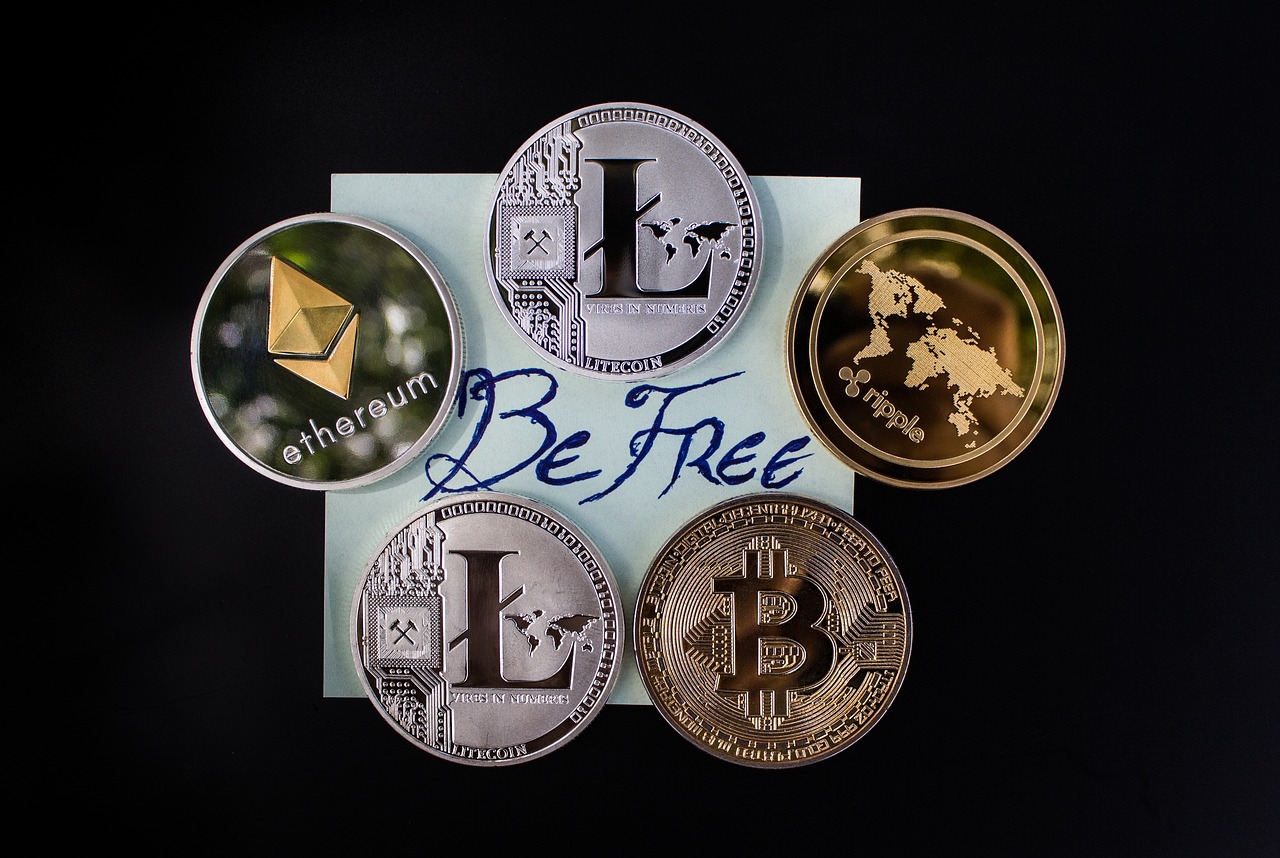
Regular Software Updates
In the fast-paced world of cryptocurrency, staying secure is not just a luxury—it's a necessity. One of the most effective ways to bolster the security of your cryptocurrency wallet is through . Just like any other software, wallet applications are susceptible to vulnerabilities that can be exploited by hackers. By keeping your wallet software up to date, you ensure that any known issues are addressed, and the latest security features are integrated. Think of it like changing the locks on your house after learning about a recent burglary in your neighborhood; it’s a proactive step to enhance your safety.
When wallet developers release updates, they often include patches for security flaws, improvements in functionality, and new features that can enhance user experience. Ignoring these updates is akin to leaving the front door wide open; it invites trouble. For instance, if a new vulnerability is discovered that could allow unauthorized access to your funds, failing to update your wallet could have dire consequences. The crypto market is rife with stories of unfortunate investors who lost their assets simply because they neglected to update their wallet software.
To make the process easier, many wallet applications now offer automatic updates. This feature is a game changer, as it eliminates the need for users to remember to check for updates manually. However, it's still wise to periodically check your wallet settings to ensure that automatic updates are enabled. If you prefer a more hands-on approach, you can set a reminder to check for updates weekly or monthly. This way, you’ll always be in the loop and can take action promptly.
In addition to security patches, updates can also improve the overall performance of your wallet. For example, you might notice faster transaction speeds or enhanced user interfaces that make managing your assets more intuitive. Keeping your wallet updated is not just about security; it's about optimizing your experience as a crypto investor.
In summary, are a critical component of maintaining the security and functionality of your cryptocurrency wallet. By committing to this practice, you not only protect your investments but also enhance your overall experience in the crypto market. So, whether you choose to automate the process or stay hands-on, make sure that updating your wallet is a priority in your crypto journey.
- Why are regular software updates important for cryptocurrency wallets?
Regular updates patch security vulnerabilities, enhance functionality, and improve user experience, helping to protect your digital assets. - How can I ensure my wallet software is up to date?
Check your wallet settings for automatic updates or set a reminder to manually check for updates on a regular basis. - What happens if I don't update my wallet software?
Neglecting updates can leave your wallet vulnerable to attacks, potentially resulting in the loss of your cryptocurrencies.
Frequently Asked Questions
- What is a cryptocurrency wallet?
A cryptocurrency wallet is a digital tool that allows you to store, manage, and transact with your cryptocurrencies. Think of it as your bank account for digital currencies, enabling you to send and receive assets securely.
- What are the different types of cryptocurrency wallets?
There are mainly three types of cryptocurrency wallets: hardware wallets, software wallets, and paper wallets. Each type has its own unique features, benefits, and drawbacks, catering to different user needs and security preferences.
- How do hardware wallets work?
Hardware wallets are physical devices that securely store your cryptocurrencies offline. They keep your private keys safe from online threats, making them a popular choice for serious investors who prioritize security.
- What are the benefits of using a hardware wallet?
Hardware wallets provide enhanced security against hacks and theft, are user-friendly, and often support multiple cryptocurrencies. By keeping your assets offline, they significantly reduce the risk of unauthorized access.
- Can you recommend some popular hardware wallets?
Some of the most reputable hardware wallets include Ledger Nano S, Trezor Model T, and KeepKey. Each of these wallets is known for its security features and ease of use, helping you make informed choices.
- What are software wallets?
Software wallets are applications that allow you to manage your cryptocurrencies conveniently on your computer or mobile device. While they are more accessible, they can be more vulnerable to online threats compared to hardware wallets.
- How can I secure my cryptocurrency wallet?
To secure your wallet, consider implementing two-factor authentication (2FA), regularly updating your wallet software, and using strong, unique passwords. These practices help protect your digital assets from potential threats.
- What is two-factor authentication (2FA) and why is it important?
Two-factor authentication (2FA) adds an extra layer of security by requiring a second form of verification (like a text message code) in addition to your password. This makes it much harder for unauthorized users to access your wallet.
- Why are regular software updates necessary for wallet security?
Regular software updates are crucial as they often include security patches that fix vulnerabilities. Keeping your wallet software up to date ensures that you are protected against the latest threats in the ever-evolving crypto landscape.

